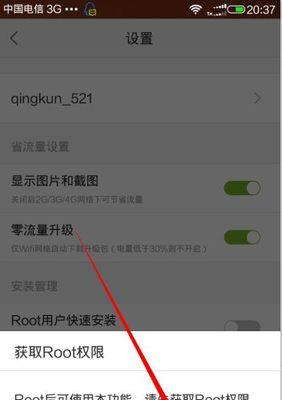
The editor of php Apple will share with you today the methods and precautions on how to obtain root permissions for Android devices. For some users who want to deeply customize and optimize their Android devices, obtaining root permissions is an essential step. By obtaining root privileges, users can gain complete control over the system, and can then delete pre-installed applications, modify system settings, install third-party ROMs, etc. However, obtaining root privileges also requires careful operation. Improper operation may result in device damage or loss of warranty. In this article, we will introduce some simple and effective methods to obtain root privileges, and provide some precautions to help you complete the process smoothly.

1. Introduction to the root permissions of Android devices

is equivalent to the administrator permissions on a computer, and the root permissions of Android devices Root authority refers to the authority for a user to have complete control over the system. Uninstall pre-installed applications to achieve higher-level customization operations. By obtaining root permissions, users can modify system files.
2. The necessity of obtaining root permissions
Flashing tools and applications and obtaining root permissions can unlock the potential of the phone and allow users to install various custom ROMs. It can also optimize device performance, achieve more personalized customization, and delete unnecessary system applications.

3. Understand device compatibility and risk assessment
Users need to understand their device compatibility and conduct related risks before trying to obtain root permissions. Evaluate. Moreover, obtaining root permissions may cause the device to lose its warranty or reduce its security. Different devices may have different root methods and tools.
4. Use third-party tools for root
Such as KingRoot, Magisk, etc. By using some third-party tools, users can obtain root privileges relatively easily. Users can complete the root process with simple operations, and these tools usually provide one-click root functionality.
5. Flashing the ZIP package with root permissions
Users can obtain root permissions by flashing this package. Flashing the ZIP package with root permissions is a common root method. And enter the flash mode of the device to operate. This requires the user to download the correct ZIP package in advance.
6. Use the ADB command to obtain root permissions
Users can obtain root permissions through the ADB command. AndroidDebugBridge (ADB) is a common tool for communicating with Android devices. And enable USB debugging on the device, which requires the ADB tool to be installed on the computer.
7. Device unlocking and official authorization methods
Allows users to obtain root privileges. Some device manufacturers provide official unlocking and authorization methods. For specific unlocking and authorization methods, users can search the official website or contact the device manufacturer.
8. Note: Back up important data
To prevent accidents, users should back up important personal data before obtaining root privileges. So backups are crucial, and gaining root access may cause problems with your device or data loss.
9. Note: Understand the risks and warranty issues
and may cause the device to lose warranty. Obtaining root permissions may result in reduced device security. Users need to fully understand the potential risks and device warranty policies before attempting to gain root access.
10. Note: Use trusted sources and tools
Users should use trusted sources and tools to operate when obtaining root privileges. To protect your device from viruses or malware, use unsolicited tools, or download files from unknown sources.
11. Methods and steps to remove root permissions
Users may need to remove root permissions from their devices in some cases. To help users return to a non-root state, this paragraph will introduce some common methods and steps to remove root permissions.
12. Recommended applications and functions after root
Users can install some applications and functions that are only applicable to rooted devices after obtaining root permissions. Such as TitaniumBackup, this paragraph will introduce some recommended post-root applications and functions, Greenify, etc.
13. FAQ: System upgrade after root
You may encounter system upgrade problems after the user obtains root permissions. And provide solutions and suggestions. This paragraph will answer some common post-root system upgrade questions.
14. FAQ: Application permission management after root
Users can manage application permissions in more detail after obtaining root permissions. For example, how to revoke the root permission of an application, etc. This paragraph will answer some common questions related to application permission management after root.
15.
At the same time, you need to pay attention to backing up important data and using trusted tools. Obtaining root permissions for Android devices may require users to conduct some risk assessment and full understanding. Users can enjoy more customization and personalized operations, but they also need to pay attention to possible security and warranty issues after obtaining root permissions.
Readers can learn about the methods and precautions for obtaining root permissions for Android devices, through the introduction of this article, as well as some recommended applications and methods to solve common problems after obtaining them. Hope it helps readers better utilize the potential of Android devices.
The above is the detailed content of How to obtain root permissions for an Android device (simple and effective methods and precautions). For more information, please follow other related articles on the PHP Chinese website!




